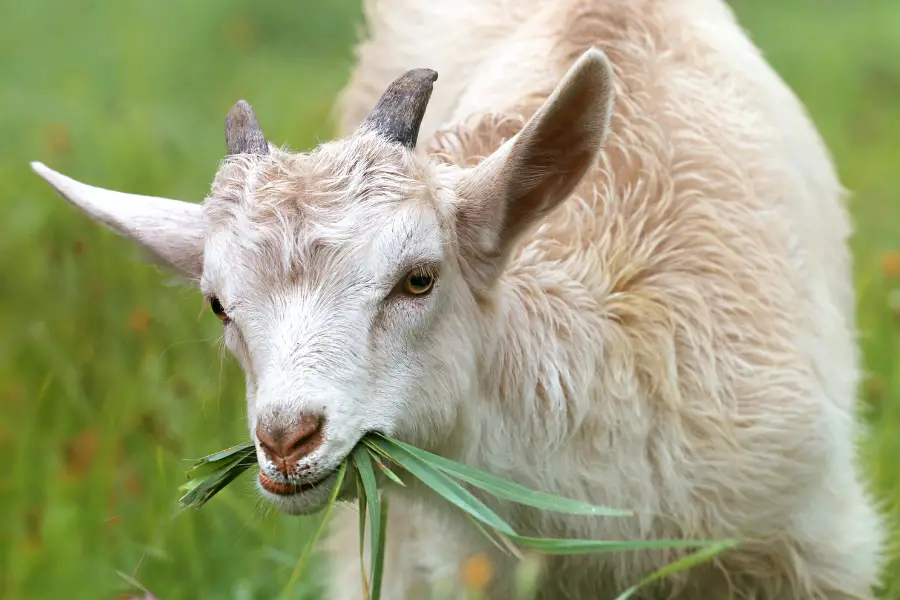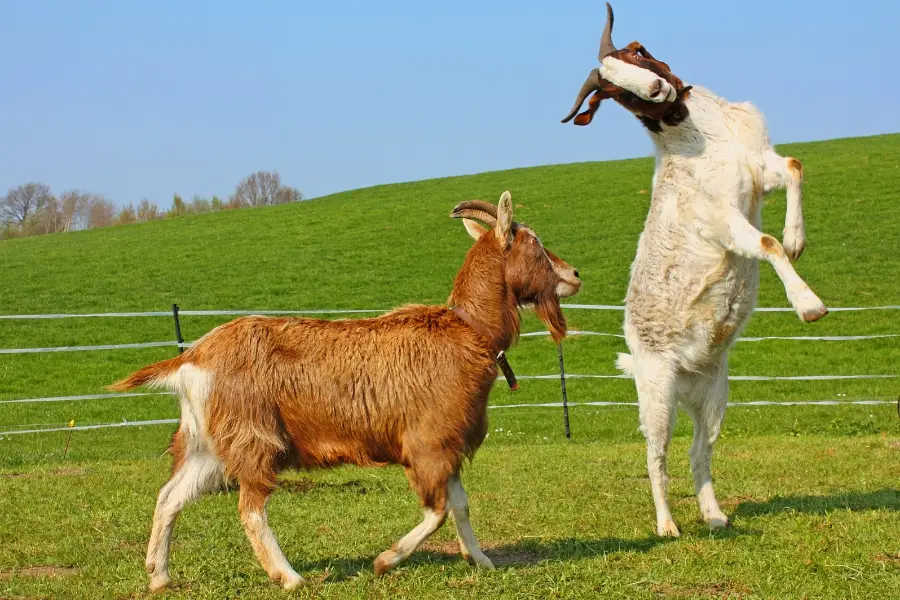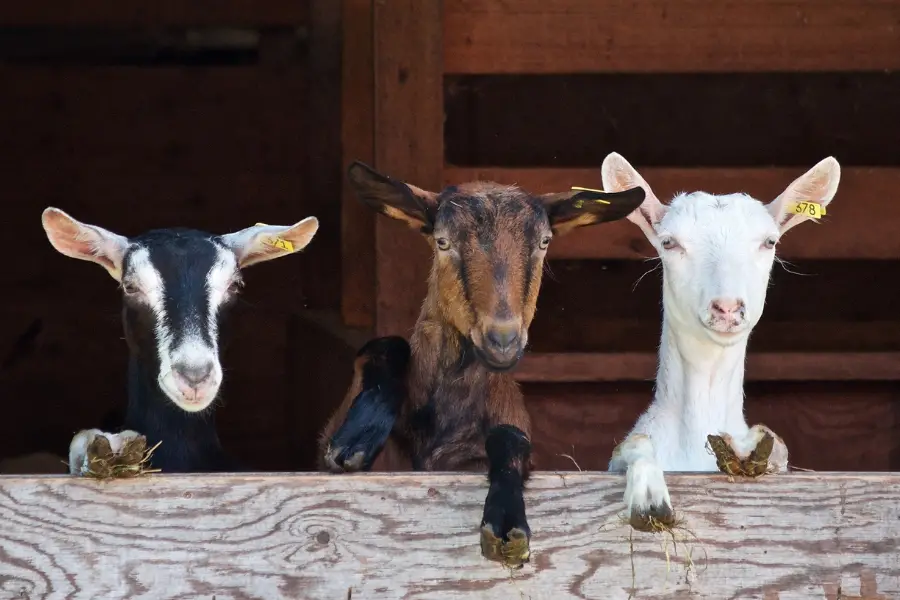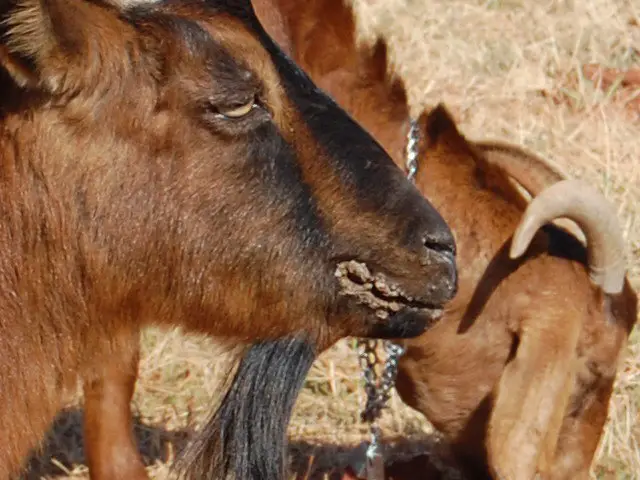
Introduction
Sore mouth, scientifically known as Contagious Ecthyma, is a common viral disease that primarily impacts goats and sheep. The disease is highly contagious and is particularly prevalent in young animals, but it can also affect adults. If left untreated, the condition can become severe, affecting the overall health and productivity of the goat. This article explores the cause, symptoms, and sore mouth in goats treatment.
Table of contents
- Introduction
- Historical Overview of Sore Mouth in Goats
- Causes of Sore Mouth in Goats
- Zoonotic Potential of Sore Mouth in Goats
- Geographic Prevalence of Sore Mouth in Goats
- Symptoms
- Sore Mouth Goats Treatment
- Financial Impact of Sore Mouth in Goats
- Financial Impact Summary
- Prevention
- Video: Oklahoma State University and USDA Official Video
- Conclusion
- Sore Mouth in Goats FAQ’s
Historical Overview of Sore Mouth in Goats
Goat Sore mouth is a disease that has long been recognized in the history of livestock management. Its prevalence in goat and sheep populations worldwide makes it one of the most ubiquitous diseases in these species. Sore Mouth in Goats is known by many names, such as Contagious Ecthyma, Orf, Scabby Mouth, Soremouth, Ecthyma Contagiosum, Pustular Dermatitis, Contagious Pustular Dermatitis, Infectious Labial Dermatitis, Contagious Pustular Stomatitis, Thistle disease, and Mouth Sores in Goats.
The earliest descriptions of the disease date back to the 19th century, where it was primarily observed in sheep populations in Europe and North America. However, given the similarity between sheep and goats and their often shared habitats, it’s likely that goats were affected concurrently.
Over the years, as livestock farming practices evolved and expanded, the disease spread to almost all parts of the world. The introduction of the disease into new areas often coincided with the movement and trade of infected animals, underscoring the contagious nature of the disease.
The 20th century brought about a deeper understanding of the disease, its causative agent, and its transmission dynamics. The identification of the Orf virus as the causative agent was a significant milestone in understanding and controlling the disease. Further research in the latter half of the 20th century led to the development of vaccines, providing a vital tool in the prevention and control of the disease.
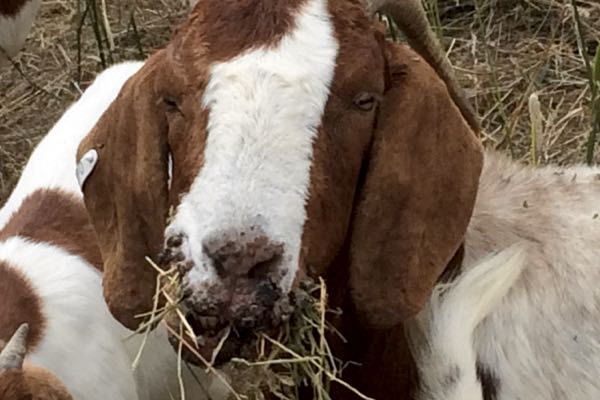
Despite these advances, goat sore mouth remains a prevalent disease in many goat populations worldwide. It’s a testament to the resilience of the Orf virus and the challenges in managing a highly contagious disease in large animal populations.
Throughout history, mouth sores in goats has had significant impacts on goat productivity and the livelihoods of goat farmers, reinforcing the importance of continued research and effective disease management strategies. The historical journey of this disease underscores the need for continual vigilance, sound animal husbandry practices, and the use of modern preventive measures such as vaccination.
Causes of Sore Mouth in Goats
Sore mouth in goats is caused by a virus, specifically the Orf virus, which is a member of the Parapoxvirus genus and Poxviridae family. This particular virus is incredibly hardy and can survive in various environmental conditions for several years. The resilience of this virus makes it challenging to control and completely eradicate.
Transmission
The transmission of the virus mainly occurs through direct contact with an infected animal. However, indirect contact with virus-contaminated objects such as feeding troughs, bedding, or even the hands of a person who has been handling infected animals can also spread the disease.
Zoonotic Potential of Sore Mouth in Goats
Sore mouth, also known as Contagious Ecthyma or Orf, is a zoonotic disease, which means it can be transmitted from animals to humans. The virus can infect humans who come into contact with infected animals or with objects that have been contaminated by the virus.
In humans, the disease is often referred to as Orf or Orf disease. After exposure, it typically takes about a week for symptoms to appear. Humans infected with the Orf virus typically develop sores or lesions on their hands or fingers, as these are the areas that usually come into direct contact with the infected animal. These sores can be painful and may take several weeks to heal completely.
People with compromised immune systems, such as those with HIV/AIDS or those receiving immunosuppressive therapy, may experience more severe symptoms and complications. However, it’s important to note that the disease is generally self-limiting in humans and usually does not require treatment, except in rare cases where secondary infections occur.

To prevent transmission, it’s essential to use good hygiene practices when handling animals with sore mouth. Wearing gloves, washing hands thoroughly after handling animals, and avoiding direct contact with sores can help reduce the risk of transmission.
As for other species, the Orf virus primarily affects sheep and goats, but it can also infect a range of other animals, including deer, reindeer, camels, and even some wild animals. However, the disease is typically most severe and most commonly observed in sheep and goats.
In summary, while sore mouth in goats can be transmitted to humans and other animals, good hygiene practices and appropriate protective measures can significantly reduce the risk of transmission.
Geographic Prevalence of Sore Mouth in Goats
Sore mouth in goats is a global problem and can be found in almost all parts of the world where goats are raised. It’s not restricted to any specific geographic location or climate. Both developed and developing countries are affected by the disease due to its highly contagious nature and the hardiness of the causative Orf virus.
In terms of prevalence within specific countries, it is more commonly reported in areas where the animal husbandry practices involve close confinement of animals, as the disease spreads more readily in these conditions. It’s also more commonly observed in regions where there are more significant seasonal variations. For instance, in the United States, cases of sore mouth often spike during the spring and fall, corresponding to periods of shearing and lambing.
There’s also a higher incidence of the disease in regions where intensive farming practices are employed, such as feedlots and dairy farms. These conditions promote the spread of the virus due to the close proximity of animals, frequent contact, and shared use of equipment.
Overall, while certain farming practices and climatic conditions can contribute to the incidence of sore mouth, it’s essential to understand that the disease can occur anywhere and affect any goat herd. Thus, continuous vigilance, sound biosecurity measures, and appropriate preventive steps are critical regardless of geographic location.
Symptoms
In general, the primary sign of sore mouth is the appearance of sores or blisters around the mouth, nose, eyes, and sometimes the feet. These sores may first appear as raised, red areas on the skin that quickly progress into weeping blisters. These blisters will then scab over and, in severe cases, can coalesce to form large, painful scabs. The condition can cause severe discomfort, and as a result, affected goats may refuse to eat or drink, leading to weight loss and poor growth.
Sore Mouth Goats Treatment
Sore mouth in goats is typically self-limiting, meaning that it will resolve on its own over time. However, due to the pain and discomfort associated with the condition, sore mouth in goats treatment often requires supportive care. This may involve providing soft, easily consumable foods that won’t irritate the mouth sores in goats, and ensuring that the goat stays well-hydrated. If the mouth sores prevent a kid from nursing, then you should consult your veterinarian for advice.
It’s also crucial to isolate infected animals to prevent the spread of the virus to other members of the herd. In some cases, topical ointments may be used to help soothe the sores and promote healing. Treat secondary infections if they arise, and use repellants to keep fly larvae from getting into the open wounds. Work with your vet in these instances.
Financial Impact of Sore Mouth in Goats
The financial impact of sore mouth disease in goats can be substantial, especially in large commercial herds where an outbreak can significantly impact productivity. The consequences can be divided into direct and indirect costs.
Direct Costs
The direct costs of sore mouth disease stem primarily from a decrease in production. Affected goats may stop eating due to the painful sores around their mouths, leading to weight loss and a decline in overall health. For dairy goats, milk production can drop significantly, impacting the farm’s dairy output and income.
Younger goats who contract the disease may exhibit stunted growth, affecting their market value. Also, in severe cases, the disease can lead to death, especially in kids, causing a loss in potential revenue.
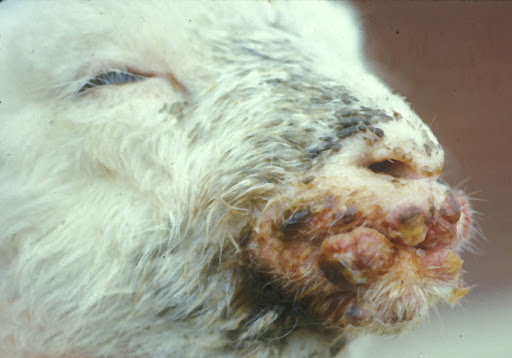
Indirect Costs
The indirect costs associated with sore mouth disease can also be high. These costs often include increased labor, as infected goats require additional care and monitoring. Veterinary costs, including consultations, medications, and possible laboratory tests, are also a part of the indirect costs.
Implementing biosecurity measures to prevent the spread of the disease can also lead to additional expenditures. These may include costs for disinfection procedures, personal protective equipment, and potential modifications to housing or management practices.
Moreover, if a herd develops a reputation for having recurrent sore mouth outbreaks, it can negatively affect sales of both animals and animal products, as buyers may be reluctant to purchase from a herd with a known disease issue.
Financial Impact Summary
Although the initial financial impact of a sore mouth outbreak might seem minor, the cumulative direct and indirect costs can significantly affect a farm’s profitability. Thus, prevention strategies, including vaccination and strict biosecurity measures, are crucial to maintain a healthy and productive goat herd. These strategies, although they involve an upfront cost, can save a farm from considerable financial losses in the long run.
Prevention
Vaccination is available and can be used as a preventive measure, particularly in herds that have had previous outbreaks. It’s important to note, however, that vaccination itself can cause a mild form of the disease which can spread, so careful handling and isolation of vaccinated animals are necessary.
Video: Oklahoma State University and USDA Official Video
Veterinarian Dr. Gene Parker Jr, DVM and Area Food Animal Quality and Health Specialist, addresses goat diseases in this official video from Oklahoma State University. The section about Sore Mouth in goats begins at 12:20. Dr. Parker does an excellent job explaining how the sore mouth in goats presents, how prevalent it is, and when the mouth sores in goats can pose the most risk to your herd.
Conclusion
Sore mouth can be a significant issue in goat herds, causing discomfort and potential production losses. By understanding the causes, symptoms, and treatment options, goat owners and caretakers can take the necessary steps to manage this disease effectively.
Sore Mouth in Goats FAQ’s
It is caused by an infection by the Orf virus.
Sore mouth in goats can lead to serious complications if the wounds on the kid or doe prevent the kid from nursing. Secondary infections can also be a problem.
Yes, humans can get the Orf virus if they come in contact with an infected goat.
It is very common. It is prevalent on every continent. If you have goats, you are likely to encounter it in you herd at some point.


